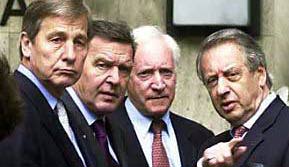| 
Monday, October 16, 2000
Holocaust
deal faces collapse FROM ROGER BOYES IN
BERLIN DEUTSCHE Telekom,
Germany's giant telecommunications group,
has finally agreed to pay £30 million
into a compensation fund for Nazi-era
slave labourers in a last-minute attempt
to prevent the unravelling of an intricate
deal with American lawyers and with the
White House. The gesture may be a case of too
little, too late. Even with Telekom's
contribution, German industry has fallen
well short of the sum it promised to pay
out for labourers forced to work in the
Third Reich. "No one wants to talk about the issue
-- many simply dodge the subject
altogether," Manfred Gentz, of
Daimler-Chrysler, who has been trying to
drum up the money, said. The Clinton
Administration agreed to issue a
"statement of interest" to discourage
American courts from proceeding with
billion-dollar class action suits against
some of Germany's top brand-name
companies, such as Dresdner Bank and
Volkswagen, but the German Government and
industry have to come up with DM10 billion
(£3.3 billion), which would be used
for the benefit of Holocaust survivors and
for a so-called "future fund" to set up
projects in Eastern Europe. The German Government agreed to pay
half the sum and eased the way for German
industry by declaring compensation fund
contributions to be tax deductible, but
most companies are resisting attempts to
squeeze cash from them. Erich Sixt,
owner of the Sixt car rental company, with
a turnover of more than £1.5 billion,
says that his company cars were
confiscated by the Wehrmacht during the
war and he sees no moral obligation to pay
up.  The
fundraisers are asking for a contribution
equivalent to one-thousandth of turnover.
"Five million marks is a lot of money to
explain away to my shareholders," Herr
Sixt said. The Leo Kirch media
group has also declined to pay. "Our view
is that there is no general obligation on
behalf of the whole of the German
economy," a spokesman said. Other
companies said that they refused to be put
under pressure. The
fundraisers are asking for a contribution
equivalent to one-thousandth of turnover.
"Five million marks is a lot of money to
explain away to my shareholders," Herr
Sixt said. The Leo Kirch media
group has also declined to pay. "Our view
is that there is no general obligation on
behalf of the whole of the German
economy," a spokesman said. Other
companies said that they refused to be put
under pressure.
The Rewe supermarket chain says it has
already given financial support to the
distribution of Steven Spielberg's
film Schindler's
List and saw no need to make a
further commitment. Out of 220,000
companies approached for a contribution,
only 4,200 have signed up.With Telekom's
contribution, the total will be DM3.3
billion, DM1.7 billion short of the
promised sum. About DM2 million a week is
flowing in. At that rate the target will be reached
only in three years time, but already most
surviving slave labourers are well into
their 80s. The foundation is to hold a
crisis meeting tomorrow. The bulk of the
money has come from the 16 founding
members, companies such as Allianz,
Siemens and DaimlerChrysler. All have
tarnished wartime pasts and all have
strong interests in the American market.
Indeed Telekom's larger-than-expected
contribution reflects, in part, its
ambitions to buy into the American
market. The climate of approval for German
companies in America will sour quickly
unless industry produces a more
wholehearted response. There are only two possible options to
head off a collapse in the slave labour
deal and a serious deterioration in
relations with the United States on the
eve of a new Administration: the first is
that the big companies pay more to make up
for the shortfall from medium-sized
business; the second is that the
Government pays more. Website
photo: German Chancellor
Gerhard
Schroeder (second from left) with
friends
(right: Paul Spiegel, the new,
revered
head of Germany's Jewish community)
©
Copyright of Times Newspapers Limited
2000.
Related items on this
website:  Nestlé
makes Holocaust settlement
Nestlé
makes Holocaust settlement WJC
says even innocent firms must Cough Up
("donate")
WJC
says even innocent firms must Cough Up
("donate") Finkelstein
accuses Elie Wiesel and Jewish leaders
worldwide of a vast shakedown
Finkelstein
accuses Elie Wiesel and Jewish leaders
worldwide of a vast shakedown Finkelstein
index
Finkelstein
index Origins
of anti-Semitism index
Origins
of anti-Semitism index
|